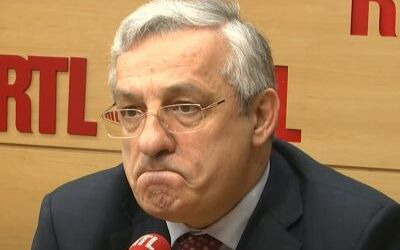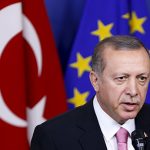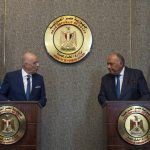A former Turkish intelligence officer who admitted to the illegal trafficking of arms and jihadist fighters to Syria by Turkey’s National Intelligence Organization (MIT) was appointed to a senior position at the Organization for Security and Co-operation in Europe (OSCE) to combat Islamophobia.
Secret intelligence documents obtained by Nordic Monitor revealed that İsmail Hakkı Musa, who had served as number two at MIT for four years, personally signed confidential letters owning up to involvement with intercepted arms bound for jihadists in Syria when asked by prosecutors. He also admitted in writing that buses secretly transporting jihadists through Turkish territory were part of the MIT operation.
Musa was appointed as the personal representative of the OSCE Chairperson-in-Office on Combating Intolerance and Discrimination against Muslims during Poland’s chairmanship in July 2022 thanks to the lobbying of the Islamist government in Turkey, led by President Recep Tayyip Erdoğan.
Muse’s bio posted on the OSCE website does not mention that he had worked for Turkish intelligence and instead only cites various positions he held as a Turkish diplomat. The press statement issued by the Turkish Foreign Ministry on his new position at the OSCE also omitted that key detail in his background and completely ignored his work at MIT.
It appears Musa went to great lengths to hide his background at Turkey’s notorious intelligence agency and to cover up his track record in fueling the conflict in Syria by sending thousands of truckloads of arms, as his boss admitted in a leaked audio recording in March 2014, and facilitating the travel of radical jihadist fighters to the country.
Instead, the bio on the OSCE website states that he had served in the prime minister’s office between 2012 and 2016 without disclosing the fact that he was in fact working for MIT, which was subordinated to the prime ministry.
Musa transferred to MIT in 2012 and helped establish a new unit called Strategic Analysis Directorate, reporting directly to the pro-Iran intelligence chief Hakan Fidan.
The 64-year-old diplomat transferred to MIT in 2012 and helped establish a new unit called Strategic Analysis Directorate (Stratejik Analiz Başkanlığı), reporting directly to intelligence chief Hakan Fidan, a confidant of Erdoğan and a pro-Iran Islamist figure. He served in the number two position as deputy undersecretary of the agency, running the Electronic and Technical Intelligence Directorate (Elektronik ve Teknik İstihbarat Başkanlığı) and later the Foreign Intelligence (Dış İstihbarat) unit.
Albeit briefly, Musa even took over the agency for a month as acting chief between February 10-March 10, 2015, when Fidan resigned to run for a parliamentary seat. President Erdoğan did not approve Fidan’s move to politics and forced him to return to the agency as undersecretary.
Two confidential letters that carry MIT’s official logo and Musa’s signature revealed that he was closely involved in illegal arms and vehicle shipments to Syria for armed jihadist groups as well as in transporting fighters through Turkish territory in secret MIT operations.
Trucks carrying illegal arms to jihadists in Syria were intercepted twice by the police in a border province on January 1 and January 19, 2014, while two buses that took fighters from an al-Qaeda-controlled area in Syria on January 9, 2014 and brought them back to Turkey under the watch of MIT agents were the subject of a criminal investigation by the local prosecutor.
Musa had to send letters to Turkish prosecutors who were investigating the transfer of illegal arms and the transport of fighter across the Turkish-Syrian border in violation of Turkish law.
One letter, marked secret and signed by Musa with his title as deputy undersecretary of MIT, advised a prosecutor that the information about transported jihadists and arms was a “state secret” that should not be publicized.
He was referring three cases that exposed MIT as cooperating with jihadists, and prosecutors scrambled to find out why MIT was involved in illegal operations that violated a number of Turkish laws.
One of the cases refers to a secret operation that took place in January 2014 and was exposed when local police units were called in to search for two buses used to shuttle armed jihadist fighters from one point on the Syrian border to another in order to change the dynamics on the ground on the Syrian side.
The fighters were transported across the border on the night of January 9, 2014 in buses contracted by MIT as part of the illegal operation.
The fighters were transported across the border on the night of January 9, 2014 in buses contracted by MIT, which thought everything had gone smoothly with no red flags raised in the illegal operation.
They arrived at the border gate in the Turkish town of Akçakale in Şanlıurfa province and passed through the gate without any screening with the help of MIT agents in an escort car. The unloading of the fighters, arms and ammunition was completed at around 5 a.m. The drivers were ordered to take the buses back to Turkey.
Public prosecutor Mustafa Sırlı launched a criminal probe into the drivers and owner of the bus company. He also wanted to go after the intelligence officers but was abruptly removed from the case. However, he managed to complete a field examination of the places where the jihadists were picked up and where they were dropped off. The evidence revealed that the building in Syria that the drivers testified was the dropping-off point for ammunition and fighters had an Islamic State in Iraq and the Levant (ISIL) flag hoisted on top and Jabhat Nusra messages written on its outer walls.
The letter signed and sent to the prosecutor’s office by Musa also involved MIT agents who were exposed when they were found to have been working with an al-Qaeda group in Turkey that was stealing trucks to send to Syria. Flatbed trucks that can be mounted with a machine gun and that are in popular demand by jihadist groups in Syria were targeted in particular. Three of the 19 suspects who were detained by law enforcement in 2013 were al-Qaeda militants, and they were also involved transporting foreign fighters to Syria. Six suspects were MIT agents, while the rest were identified as drug traffickers.
On March 27, 2014 Musa wrote a letter to the prosecutor’s office confirming that those six suspects were in fact MIT agents and claimed they were carrying out an assignment even though they were using their private phones to communicate. He tried to mask the revelation by invoking state secrecy and warned that the information about MIT’s involvement with al-Qaeda suspects must not be revealed to the public.
The same excuse was used by Musa when police and gendarmerie units near border provinces intercepted illegal arms shipments bound for Syria on Jan. 1 and Jan. 19, 2014. The shipments were escorted by the Turkish intelligence agency, although there was no official authorization as required by law. The shipments contained thousands of artillery shells, heavy machine gun rounds and mortar shells.
Musa’s new position at the OSCE provides him with a new cover to keep up the intelligence work he had been doing for years.
Again, Musa confirmed the cargo load belonged to MIT in a secret letter to the prosecutor’s office, asking for non-disclosure, while government officials publicly claimed that the intercepted trucks were carrying humanitarian aid to Syria. Immediately after the exposé, the prosecutors who launched criminal investigations into the MIT agents for transporting illegal arms were sacked or reassigned and later arrested and tried on fabricated charges of espionage.
In 2016 Musa was appointed ambassador to France and worked there to organize proxies from Turkish and Muslim diaspora groups to promote his boss and the Erdoğan government’s political Islamist ideology. Strasbourg, where Turkey’s religious authority, the Diyanet, has set up a headquarters to raise a new generation of Islamists among European youth, was in Musa’s portfolio.
Upon his return to Turkey in 2021, Musa continued similar operations, this time from his post at the Turkish Foreign Ministry as the director general of Turkish Citizens Abroad and Education. The new position at the OSCE provides him with a new cover to keep up the intelligence work he had been doing for years and grants him otherwise-impossible access to places and people.
Abdullah Bozkurt
Source: ME Forum



